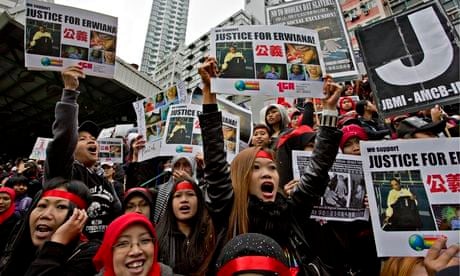On a dark, damp Sunday afternoon, hundreds of women are massed in a city park. Hong Kong's domestic workers have few places to meet on their only day off; many have huddled under flyovers to stay dry as they chat to friends. But this group is grinning as they brave the downpour. Some are barefoot in the puddles as they dance in plastic raincoats, twisting left to right and raising their hands to the heavens.
"Women united will never be divided! Migrants united will never be divided!" chant women in hijab, dipping and turning alongside others in hot pants.
"With this kind of solidarity, people can be heard," said Eni Lestari, chair of the International Migrant Workers Alliance, as she surveyed the rally. "More and more people are speaking out. But in terms of conditions, it's not getting better."
The numbers of foreign domestic helpers, overwhelmingly female, have soared across the Asia-Pacific region. In 1992, Hong Kong had slightly more than 100,000; now there are three times as many. Malaysia has 125,000; in Thailand, 88,000 were registered in 2010. But the true numbers are thought to be far higher for all three. The Filipino and Indonesian diaspora have been joined by Burmese, Nepalese and Cambodian workers.
But the flow of migrants, and their growing voice, has far outpaced their progress in winning protections. Reports of exploitation by employers and agencies are rife; rights are limited. While Singapore recently introduced a statutory weekly day off, campaigners say it is not being adequately enforced and employers can legally avoid granting it by increasing pay. Migrants in Taiwan have been fighting for the same right, without success.
The One Billion Rising event in Hong Kong – one of many worldwide demanding an end to violence against women – had a particular resonance for the domestic workers who organised and participated in it. Recent allegations of abuse have spurred a fresh push for improved conditions and rights.
In September, a judge jailed a couple who had tortured and beaten their maid with a bicycle chain. Last month, Erwiana Sulistyaningsih returned home to Indonesia with extensive injuries and reportedly weighing less than four stone (25kg). Her employer has since been charged with wounding, common assault and criminal intimidation.
Lestari, who is from Indonesia, knows from experience how vulnerable and isolated workers can be. She said her first employers did not give her a single day off in four months; paid her only half her promised wages; insisted she eat pork despite her being Muslim; and banned her from talking to people outside the house.
"I didn't know where the consulate was; I didn't know the immigration department; my passport was kept by the agency. I ran away and an NGO helped me to find shelter," she said.
First she learned about her rights; then she shared her new knowledge with others. As an Indonesian worker, she credits Filipino women – who came to Hong Kong earlier – for helping teach later arrivals how to organise.
Social media ensures that information spreads fast, particularly since domestic workers are unusually dependent on their mobile phones for communication with the outside world. Improved awareness of their rights enables them to challenge unfair treatment.
But "our problem is not simply bad employers, but bad policies", Lestari said.
Domestic workers' organisations, and the new HK Helpers campaign supporting them, are seeking to end abuses by agencies who charge fees of as much as HKD$21,000 (£1,620) and confiscate workers' documents. The legal maximum is around HKD$400.
They also want maximum working hours legislation and an end to the "two-week rule" – giving workers just a fortnight to leave Hong Kong when their employment ends – and the insistence they live with their employer. Those regulations, say activists, make it harder to leave an abusive situation – especially if helpers have large debts to repay to the agency that placed them.
But even when workers speak out, officials in home and host countries turn a blind eye to problems because of migration's economic benefits, said Norma Kang Muico, Asia-Pacific migrant rights researcher for Amnesty International. "Authorities disregard them because they are not voters and have no right to abode." Domestic workers are specifically excluded from legislation allowing foreign nationals to gain permanent residency after living in Hong Kong for seven years. A legal challenge to their exclusion was rejected by the special autonomous region's highest court last year.
Mark Daly, the solicitor who represented the workers, said the case brought to the surface "the divide between those believing in a multicultural society based on respect and dignity and those believing that you can have second-class citizens … Regrettably, Hong Kong society is slow to change attitudes and I think the HKSAR government is disappointing in this respect."
Joseph Law, founder of the Hong Kong Employers of Domestic Helpers Association, accused foreign critics of failing to understand local conditions and of seeing themselves as saviours. He said he was angered by the focus being on claims of violence and insisted problems were "individual and isolated". However, in a 2012 survey of 3,000 domestic workers in Hong Kong, 58% reported verbal abuse, 18% physical and 6% sexual.
Law's association rejects limits on the numbers of foreign domestic workers, but also objects to them being given permanent residence. "They might want to work in other places and live separately. Domestic workers are what we need," he said.
Lestari said it was time for Hong Kong to recognise the true contribution made by helpers.
"We free up family members to contribute to development. Fifty percent of our income goes here: food, clothing, transport, phone bills. We enrich Hong Kong culture because we have brought our culture and helped make it a vibrant international city. But they are boxing us in," she said. "It's not only discrimination – it's social exclusion."





Comments (…)
Sign in or create your Guardian account to join the discussion